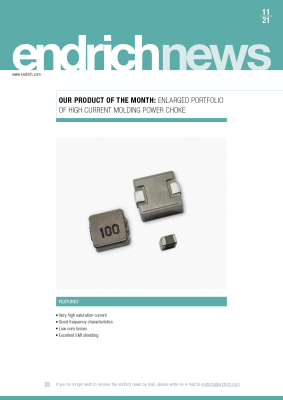Endrich.News
Endrich.News
CURRENT
ARCHIVE
April 2024 >>
Immigration - an unresolved problem!
From 1940 to 1945, I lived with my parents in the Sudetenland, now the Czech Republic. After the end of the war, the so-called "Reich Germans" were more than unpopular and were expelled. When they arrived in West Germany, refugees from the East were distributed among communities.
The welcome in the West German communities, which suddenly had to give up part of their own living space, was not warm. At the time, there was the so-called "housing management", which meant that all vacant rooms were confiscated and occupied by refugees.
However, as the state had hardly any financial resources, the so-called "equalization of burdens" was invented, meaning that every homeowner was given a compulsory mortgage on their house - regardless of whether they agreed to it or not. The first "solidarity surcharge".
At that time, Germany was administered by three military governments in the three zones (English, French and American). More than twelve million people were resettled from the former German Reich territories in Poland and the Czech Republic within a few months, and as the people had learned from the dictatorship to accept public decrees without complaint, a process of assimilation was able to slowly but successfully take hold in the communities.
Today we have the problem of immigrants who are looking for a new home out of sheer necessity and to escape their sometimes terrible living conditions. The language problems and, above all, our jungle of regulations are an extreme obstacle to settling down. There are many doctors, lawyers, craftsmen and even simple workers among these people who are forced to seek shelter and a home here, and they would help us considerably to alleviate the current shortage of workers.
Integration is undoubtedly more difficult by the lack of German language skills and the cultural differences in some cases.
Why is it not possible to make it compulsory for every new immigrant to attend a crash course in German and about our legal system, customs, values and traditions?
Since they have decided to leave their homeland and start a new life in a safe democratic country, this would be reasonable. The consequences of immigration put our state in an extreme financial situation. We have to use our tax money for these people to finance their lives at the beginning. Most of them would rather earn this through their own work.
The state would receive income tax, it would get the social security contributions in the social security funds and we would certainly have more satisfied new citizens.
The baby boomers are retiring and there are currently not enough newborns. We are becoming a nation of old people without immigration. I wonder where is the common sense of our elected representatives to finally understand that without the immigrants we will have a problem in the future that we can only solve by integrating these new citizens.
Do we want a Germany with retirement homes without carers and factories without workers?
Yours sincerely,
Wolfgang Endrich
Downloads
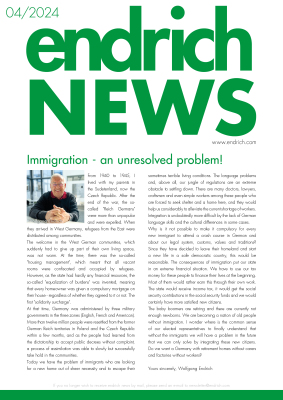
March 2024 >>
Do you know how many laws there are?
The economic situation is bad. One should not make a hasty judgement, because the legacy of the current government was full of holes. Putin was not taken seriously and the annexation of Crimea was ignored. The railway system was neglected, as were the roads and bridges, and then came Covid19. Many things were different after that.
The starting conditions for the new government were really not rosy, but even the appointments to ministerial posts were - to put it mildly - unfortunate. When Ukraine was invaded in February 2022, it became clear that the priority in the appointments was unfortunately not expertise, but merit in party work and/or other reasons.
Examples: A defence minister walks around the military training ground in high heels and when war breaks out she offers the Ukraine 5,000 steel helmets. Another minister is an expert in poetry, but his knowledge of bankruptcy law is not very well developed. Another person showed enormous gaps in his knowledge despite having studied law for many years.
The coalition argues and passes laws that have become a real hit with the public, such as the heating law. It became clear that our elected government lacked expertise and a feel for the needs and wishes of the people in many cases. Porcelain was broken, the population is highly insecure and dissatisfied. Party political wishes in the social sector could not be fulfilled. Germany has become a prescriptive state in which everything is regulated. The energy turnaround is necessary because we cannot be indifferent to global warming, but without the understanding and approval of the population, the most beautiful party-political ideologies are of no use.
Why did the nuclear power plants that would have saved us from energy price increases have to be shut down for ideological reasons during the energy crisis? Why is industry being burdened with a supply chain law that can only be complied with at great cost? It does not help the countries that are affected. Every day we hear about new laws from Berlin or Brussels.
An example from the housing sector: How many building regulations exist in Germany? The Association of Towns and Municipalities estimates 20,000, including 4,000 DIN standards alone. This is one reason why the construction industry is doing so badly at the moment. One solution to many of the problems that are placing an enormous burden on our economy in all areas would be to clear out and minimise the entire body of legislation in Germany. This would mean that fewer officials would be needed to monitor compliance with these laws. Many authorities are hopelessly overstrained!
Dismantling the legal system would dramatically reduce the burden on the federal treasury! People would feel like running a company or setting up their own business again. The mood in the country would improve very quickly and it would be an incentive for the industry to invest and develop new technologies.
Yours sincerely, Wolfgang Endrich
Downloads
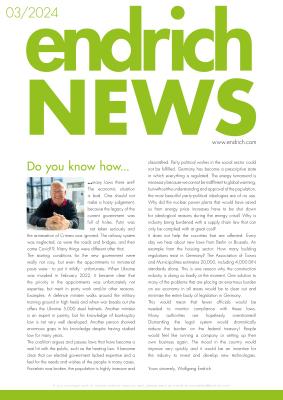
February 2024 >>
Dear readers,
We wish you all the best, good health and many happy hours in the coming year 2024.
When you look back on 2023 and read the forecasts for 2024, you don't know whether to cry or laugh. It's not just the global wars, armed unrests and other problems, it's also the new high costs for imports from China due to the bombardment of ships in the Red Sea, which are causing us considerable problems, astonishment at the numerous demonstrations against the AfD party, the farmers' tractor parades, train drivers' strikes and much more.
It would be too cheap to judge the government. Those who are already on the ground should not be kicked! Because a lot of things were already laid in their cradle by the previous government. But - in two years of government, one could have expected more wrong decisions to be corrected. But adding party ideologies on top of existing problems was certainly not a wise decision.
And just after surviving the coronavirus pandemic, when everyone was happy to have come out of this global epidemic unscathed and was actually expecting better times, things went from bad to worse. It is no wonder that voter sentiment has changed dramatically.
A poor international economic situation, falling exports, unexpectedly high inflation, ever new laws that are almost crushing us (e.g. the Supply Chain Act), a shortage of skilled workers and high energy prices are a heavy burden that we now have to live under.
But the general dissatisfaction must not lead us being seduced into making wrong political decisions - even if only out of spite. Democracy is a delicate plant and there are too many dictatorships or quasi-dictatorships - see Hungary. Poland is currently fighting hard to wrestle theirs back down. We have been in a critical situation before, in the 1930s. Back then, there was extreme unemployment that caused voters to vote for the wrong party and we slid into dictatorship.
The Weimar Republic was too weak, and farmers have also protested in the recent weeks, not only because of the agricultural diesel, but also because decades of bureaucracy and ever new regulations have placed an extreme burden on the individual's freedom of movement and threaten to destroy entire livelihoods. The bureaucracy caused by new laws and party ideologies and the constant paternalism must stop. Let's hope that politicians will now become more understanding and that the economy and the population can recover. Climate change will still cause us enough problems that need to be overcome.
Let me end with a quote from Martin Luther: If I knew that the world would end tomorrow, I would plant an apple tree today.
Stay optimistic! This year too! It can only get better!
Yours sincerely, Wolfgang Endrich
Downloads
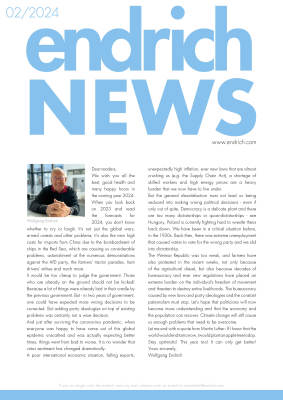
January 2024 >>
SUBSIDIES - THE SINS OF LOBBYISM!
An article in the magazine "Der Steuerzahler" issue 11/2023 reveals more than astonishing sins of our politics. Germany is by far the European subsidy champion in Europe with currently 54 billion euros!
This means that Germany exceeds the total subsidies of France, Italy and Spain combined. The subsidy report shows that grants (subsidies and tax concessions) totalling more than 122 billion euros was awarded in 2021. Followed at a considerable gap by France with 63 billion, Italy with just under 32 billion and Spain with around 20 billion, and this with an official federal budget of 336.4 billion euros!
Subsidies are state expenditure on industry and population groups that do not have to be repaid. Interest-free, non-degressive and unfortunately without an expiry date. This means that once they have been granted, they are also paid out in the following year. In the Covid19virus era, many sectors certainly received these subsidies gratefully, which was good and useful, but without a time limit, they are continued from year to year until doomsday. They have no degressive structure, which means that they do not reduce over time and, above all, the funding goals are difficult to measure and monitor. The current necessity is also not reviewed!
Subsidy policy guidelines were even formulated in 2015. Meanwhile the amount has doubled from 63 to 138 pieces. The same applies to the tax concessions granted in the meantime.
As a result, we will have to shoulder an additional 48.7 billion for subsidies and 18.4 million for tax concessions in the federal budget for 2024.
Instead of the debt brake defended by Federal Finance Minister Lindner, however, the Climate and Transformation Fund (KTF), a debt-financed special fund outside the federal budget that now has to shoulder even more subsidies, has been chosen as the central playground for this. In this way, the federal budget can officially be kept free of billions in subsidy burdens and the debt brake can be formally adhered to. In 2024, 88% is to be handled via the KTF and only 12% via the traditional federal budget.
What industrial company can afford such accounting tricks? Respect for the more than 250 lobbyists who are antichambering the ministries on behalf of their clients every day. Subsidies or tax breaks have certainly been a tried and tested means during the Covid19 period to help depressed industries such as artists, the hospitality industry and other sectors to survive at all.
In 2023 and 2024, there will no longer be any need to pay these subsidies, as the cultural sector is thriving and many other industries have also been able to say goodbye to the burdens and closures of the Corona19virus period. And now more billions are to be dumped on top of this mountain of debt, for example for energy? What's more, numerous subsidies are not even climate-neutral - on the contrary, they are actually harmful. The Greens should be fuming!
The main problem with subsidies is that they have not yet been reduced degressively and no finite date has been set for the expiry of such subsidies. Subsidies embellish every balance sheet and are a free extra income without the pressure of having to make an effort to manage without subsidies, for example by rationalising in companies or encouraging some recipients of the citizen's allowance to look for work. Unfortunately, our welfare state tempts some of our fellow citizens to abuse these achievements, which are laudable in themselves.
If I know correctly, there are currently up to 51 different ways for families to apply for help from the state.
It is actually quite normal to be confused by this multitude of options. It would certainly be appropriate to put an end to this confusion and bundle support so that we know exactly what amounts are available to each household. Digitalisation would also help. The Federal Republic of Germany is a patchwork of thousands of regulations, amendments and changes, which is already leading to an inability to move.
The consequences are citizens' disenchantment with the state and an urgent desire for change. We have imposed total immobility on ourselves. But who would trust our actual government to realise such an undertaking?
The majority of our population, as can be seen from the current election results, would like to see a dramatic simplification rather than new measures and regulations being imposed on them. It should come as no surprise that the man in the street no longer understands this confusion and wants an urgent end to it. This makes the call for a strong hand from marginalised groups in politics even more understandable.
The responsibility of civil servants for their decisions has also declined drastically, as the consultancy industry, which has to produce expensive expert opinions, is booming without equal. The expert opinions - usually also formulated by lobbyists - are intended to secure the government, members of parliament and civil servants in their decisions with as many expert opinions as possible and thus make them unassailable.
Yours, Wolfgang Endrich
(Source reference: Der Steuerzahler 11/2023)
Downloads
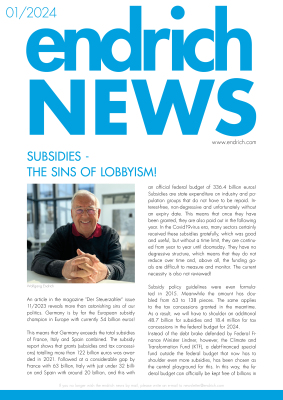
December 2023 >>
November 2023 >>
OUR PRODUCT OF THE MONTH: IOT CONTROLLER FOR HARSH ENVIRONMENTAL CONDITIONS
The iEP-7020E series industrial IoT controller is based on 13th generation Intel® Core™ embedded industrial processors and offers scalable performance in a fanless and robust design.
The controller supports fast AI processing through Intel® Iris Xe Graphic technology. The series can be operated stably under harsh conditions (-40 °C to 70 °C) with 9-36 VDC. Three Intel® i226-IT LAN (supports vPro) and two Intel® i210-AT LAN (supports IEEE 802.3AF PoE and Intel® TCC/TSN) are available for communication.
The iEP-7020E series is ideal for use as an edge controller and IoT gateway for applications such as automation, intelligent manufacturing, robotics and smart city.
The iEP-7020E series is now available from Endrich.
Contact: displays@endrich.com
Downloads
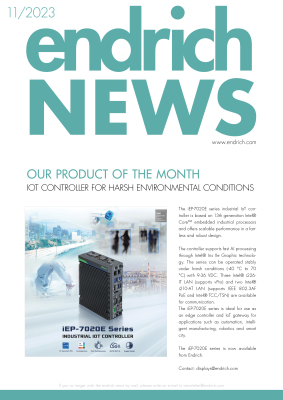
Oktober 2023 >>
Beautiful forest!
Do you still remember your school days? The biology class? What is photosynthesis?
It is the physical-chemical process that takes place in every plant and some bacteria, namely the conversion of water (H2O) and carbon dioxide (CO2) to glucose (C6H1206) and oxygen (O2) under the influence of sunlight. Without this process, which applies to all plants and thus also trees on this earth, there would be no oxygen in the atmosphere and thus no life on earth.
That is why we urgently need green meadows and forests for our life. And if you reverse this process, i.e. burn wood, for example, the process takes place in reverse, so to speak, i.e. carbon dioxide is produced, among other things. Carbon dioxide is one of the causes that triggered the climate change. In addition, when wood is burned, fine dust emissions are produced, which are particularly harmful to the lungs and just as harmful as those produced by road traffic and industry. Furthermore, in addition to the toxic carbon monoxide, the gases methane (CH4) and nitrous oxide are also produced, with methane and nitrous oxide contributing 25 and 298 times more to global warming than the same amount of carbon dioxide.
The Federal Environment Agency therefore finds the promotion of pellet heating, as envisaged in the new Building Energy Act (GEG), not particularly desirable (according to information in the Stuttgarter Zeitung of early September'23). It is concluded that it is not positive for our ecological balance. The forests, they say, are far too important for our ecosystem.
About 1.1 million households in Germany use any kind of wood in the form of logs, wood pellets or wood chips for heating in boilers. Furthermore, there are 11.2 million households in which so-called single-room fireplaces, for example fireplaces or tiled stoves, are installed, which could be detrimental to improving our climate balance.
Add to this the forest fires here in Germany as well as in Greece, Italy, Spain and especially in Canada, which have already had a considerable impact on the environment and continue to do so. Unfortunately, the timber industry, e.g. in Brazil, does not like to hear this, where huge amounts of forest land are still being converted into pasture land for cattle breeding, or in Romania, for example, where huge areas of forest are being cut down to produce cheap furniture.
With all the understanding for the use of natural resources, one unfortunately forgets that a forest may be quickly cleared, but it takes decades until it grows back again or no thought is even given to reforestation.
A sad example are countries with bare mountains, especially in the whole Mediterranean area, e.g. Greece, where the coveted cedar and oak wood was needed for the huge fleets in the Middle Ages and no one thought about what consequences this would have for posterity. The fertile soil was washed away, leaving only rocks.
For thousands of years, mankind has committed unconscionable overexploitation of the treasures of our nature. The climate balance could only be described as balanced if a corresponding amount of wood could grow back in time. But this has not happened at all in the last two millennia, especially in the last century.
Germany is also a sad example of how forests have been sacrificed to increasing agriculture. Just think of the original Black Forest or the impenetrable forests in northern Germany that served our ancestors as protection against the Roman military.
Environmental awareness has been steadily reduced in our thinking and the cutting down of forests is perceived as a completely natural process. We have sung about the beautiful forest in poems and songs, but the subject of reforestation to protect the environment has not been an issue for us in the last 2,000 years.
Only the clear change in our climate, the increasing global warming have abruptly jolted us out of our reverie. The clearly visible changes in the environment, the melting of the glaciers in the Alps or at the North and South Poles, the flood disasters, etc. were necessary to wake up humanity and take note of the overexploitation of nature and try to put a stop to it.
The inventions of nuclear power and the use of the wind and solar industries were beneficial inventions that were unfortunately unnecessarily slowed down and hindered in their effect by hysterical political decisions (e.g. ending the use of nuclear power) or the egoism of some fellow citizens (that wind turbines would disfigure the landscape). Not to mention the many regulations, so that, for example, it takes six years to get an approval for a wind turbine!
Unfortunately, the political decision-makers in our government have not been any smarter than the voters either, and have now caused us to engage in an extreme race against time to prevent or at least contain even greater damage to our country's energy supply for industry and households. Any law that sustainably reduces global warming is good, but the new Building Energy Act which is driven by ideologies, is inherently bad.
If you ban lignite and hard coal, wood and pellets have to be banned too!
Every newly planted tree needs approx. 40-50 years to form the wood mass that makes felling profitable!
But: An old tree produces about 1,000 kg of oxygen per year (enough for 10 people), and can filter up to 1,000 kg of dust, bacteria and fungal spores from the air! Therefore, "afforestation" of cities and communities is also important.
It‘s a pity that not all people know that!
Wolfgang Endrich
Downloads
April 2022 >>
LOOK FORWARD TO OUR UPCOMING WEBINARS:
- April 27, 2022:
High precision current measurement on magnetic basis - May 18, 2022:
ADAM TECH Pogo Pin / Magnetic Connectors / Modular Connectors - July 13, 2022:
Customized solutions for displays, touch and embedded systems
REGISTRATION UNDER: WWW.ENDRICH.COM/EN/EVENTS
Downloads
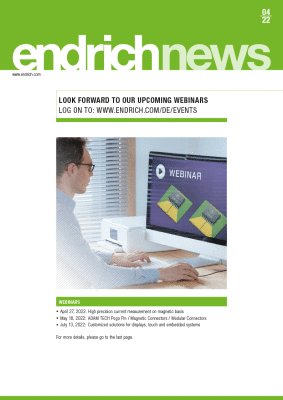
March 2022 >>
February 2022 >>
OUR PRODUCT OF THE MONTH: MIDxxW0505A MPS ISOLATED DC/DC POWER MODULES: 0.25 W TO 1 W
FEATURES:
- Input Voltage Range: 3 V to 3.6 V, or 4.5 V to 5.5 V
- 3.3 V/5 V Output Voltage
- 0.4 % Load Regulation, 1.5 % Line Regulation
- 1.5 kVDC/3 kVDC Isolation
- Integrated Transformer
- Passes CISPR32 Class B EMI
- Available in an SOICW-16 Pac
Downloads

January 2022 >>
PRODUCT OF THE MONTH:
SURGE RESISTORS WITH DOUBLE AND TRIPLE POWER RATING – FPS SERIES
FEATURES DOUBLE POWER RATING:
• High power rating to 2 W and compact size
• High reliability and high precision (1 %)
• Suitable for withstanding surge voltage
• Suitable for lead free soldering
• Meet AEC-Q200, RoHS compliant & halogen free
FEATURES TRIPLE POWER RATING:
• High power rating to 0.75 W of 1206 size
• High reliability and high precision
• Surge performance superior than general thick-film resistors
• Suitable for lead free soldering
• Meet AEC-Q200, RoHS compliant & halogen free
Downloads
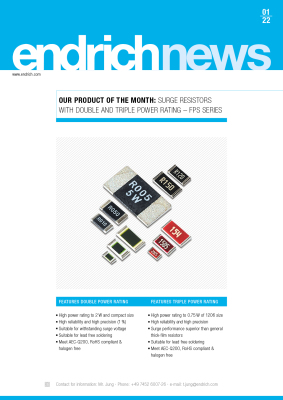
December 2021 >>
November 2021 >>
October 2021 >>
OUR PRODUCT OF THE MONTH: World’s Fastest & Most Accurate Isolated TMR Current Sensors
FEATURES:
- AC or DC Current Ranges: up to 50 A
- Up to 6 kVRMS Rated Isolation Voltage per IEC 62368 and UL1577
- Total Output Error: Down to 0.65 %
- 1 MHz Bandwidth; 300 ns Response Time
- Integrated Current Carrying Conductor
- Integrated Common Mode Field Rejection
- Over-Current Detection Output Pin (CT43x)
Downloads


Endrich Bauelemente Vertriebs GmbH
Hauptstraße 56
72202 Nagold, Germany
Indagación
Pedido de muestra
Contacto
Reclamaciones
Legal Notice
Pie de imprenta
GTC



